FAQ: Can Content That Was Written by AI Rank on Google?

Every few months for the last few years, we see a big news story on the SEO sites or major publications about how artificial intelligence copywriting will take over the content industry. Writers fear for their livelihoods, site owners see dollar signs in all the money they save, and – most importantly – the agencies making the AI copywriters push the narrative.
The question is, can AI content rank on Google? That's really what matters, right? If it can't rank, it's worthless to anyone who isn't a spammer. On the other hand, if it can rank, maybe it is the "future of SEO."

Let's dig in and look at the situation as it currently stands.
2024 Update and Google Statements
Over the past year, Google has made a few significant public statements about AI content specifically, as well as released several updates to their search algorithms that have implications for using AI-generated content:
- In a blog post published in December 2020, Google emphasized the importance of understanding user intent and providing relevant, high-quality content that meets that intent. While AI-generated content can be helpful in some cases, Google has made it clear that it will not rank content solely based on its use of AI technology but instead on the quality and relevance of the content itself.
- In early 2022, Google released an update to its search algorithm called the "Page Experience Update," which prioritizes web pages that provide a good user experience. This update includes several new ranking factors, such as page load speed and mobile-friendliness, which can affect the ranking of AI-generated content if it does not meet these criteria.
- Additionally, on Feb 8, 2023, Google continued emphasizing the importance of high-quality, relevant content in its search rankings. While AI-generated content can be helpful in specific applications, such as generating product descriptions or news articles, Google has stated that it will prioritize content that provides value to users and meets their search intent.
- In January 2024, Google'se SearchLiaison reiterated that content is ranked based on recency, quality, or relevancy, regardless of production method.
Its updates to search algorithms and continued emphasis on high-quality, relevant content suggest that AI-generated content will be evaluated based on the same criteria as other types of content.
AI-generated content must provide value to users, meet their search intent, and meet other standards such as page load speed and mobile-friendliness. Google also hinted at the requirement of disclosing when and where AI was used to generate content. You can read their answers on AI disclosure and how to handle authorship here.
Where Does AI-Generated Content Come From?
First, let's take a moment to talk about where artificial intelligence content comes from. There are two different origins, depending on your perspective.
The first is the conceptual origin. AI-generated content is an extension of article spinning. Article spinning is the act of taking existing content and rearranging it to make something unique. Note that I say "unique" here and not "new." There's a reason for that, which I'll get to later.
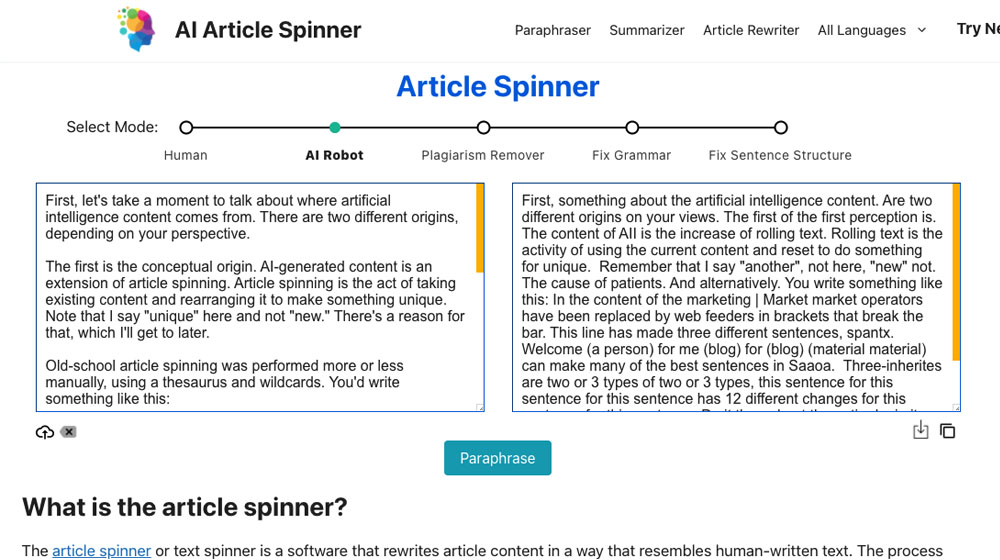
Old-school article spinning was performed more or less manually, using a thesaurus and wildcards. You'd write something like this:
Welcome everyone to my (blog about content marketing|content marketing blog|content website)!
The stuff in parentheses is replaced with one of the three options, separated by the | bar. That one line generates three different unique sentences with this method called Spintax. A more advanced version might look like this:
Welcome (everyone|friends|folks) to my (blog|website) about (content marketing|SEO)
This version can generate quite a few different unique sentences. Three options times two options times two options, or 3*2*2, equals 12 different variations for that one sentence.
Repeat this throughout an entire blog post. A blog post that's 500 words long can have hundreds of these substitutions, creating millions, billions, or more unique variations of a single piece of content.
There are several problems with this form of article spinning. First and foremost, while they may end up being technically "unique," it's easy enough to compare variations and tell that they're from the same stock. All of the non-spun text is the same, in the same patterns and duplicate formats. Strip out the spun sections, and you have templates that look identical.
Another issue is that you have to configure this manually. You have to develop which sections of a piece of content to add variations to and then use software to generate the unique versions.
And, of course, Google can reverse-engineer this. If you give them a sample of a few dozen of those unique pieces of content, they can very quickly identify the patterns. Heck, they do the same thing in their index to rank content.
That's why you'll see pages ranking for search queries despite not using any of the words from the search itself; Google understands synonyms and uses them. So, in the abstract "indexed" version of the content, Google might as well not even see the uniqueness of each post.
Spinning content evolved to be done by software automatically, using thesaurus definitions and keyword research lists, and it has become slightly more sophisticated, but these advancements are not enough to keep it from being detected by search algorithms.
That's where AI comes in. AI is the "next big thing" for pretty much every area of technology in the world. AI is used in image recognition and generation, and it's used in data analysis, cryptography, and more. It's everywhere.
This brings us to the second origin of AI-generated content: the sites and businesses offering it as a service. The two significant plays in the content space right now are AnyWord.com and Copy.AI.
When you look at these sites, you can see that they're practically the same. They offer the same service, with the same sort of disclaimers and example use cases, for things like ad copy, landing pages, SMS marketing, and so on. Heck, you can even see signs that they've rushed to be the first to market; the Copy.AI team photos are just screen captures of a Zoom call, and so is Anyword's, just in their About section.
Are There Any Case Studies on Ranking AI Content?
Now that you have the introduction, we come back to the central question at hand. Can AI-generated content rank on Google?
Here's a case study performed in 2019 by Semrush:
In this study, Semrush generated a website with GPT-2, the AI generative content network that powers AI tools like Copy.AI and Anyword. Nearly every writing platform that offers AI-generated content uses this engine; it uses the GPT-2 machine-learning algorithm to generate copy with natural language, and some of them have real people edit and refine that content or provide some other upsell.
Semrush, for this website, generated around 600 blog posts of unique content using the AI network. They hosted it on Thismarketingblogdoesnotexist.com, which references other AI generators and SEO tools such as ThisPersonDoesNotExist (which does something similar but for images of people). Incidentally, ThisPersonDoesNotExist is used a lot for black hat purposes where real-ish-looking profile photos are needed, and the owner doesn't want to use traceable stock photos. Fittingly enough, Thismarketingblogdoesnotexist.com does not exist anymore.
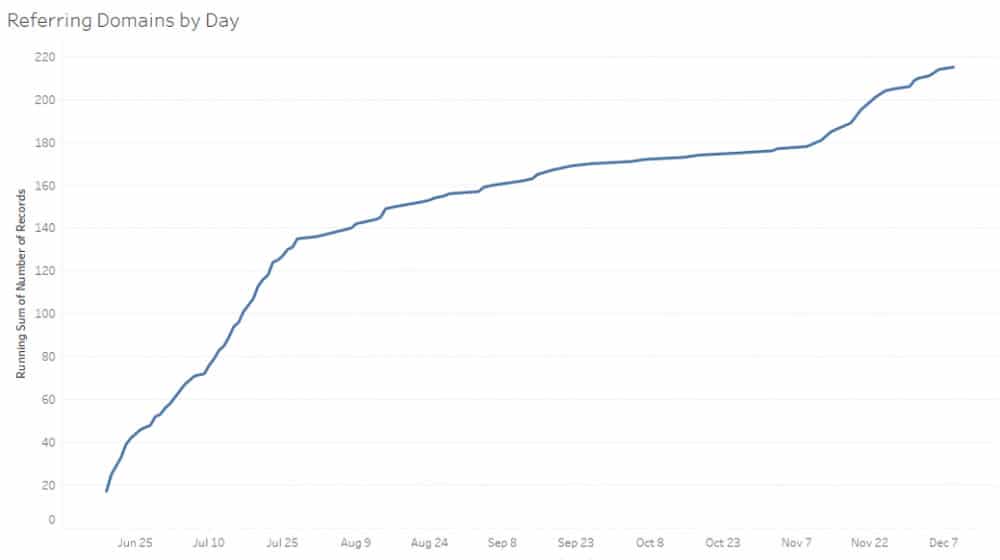
What were their results?
- 220 unique linking domains.
- 50+ of those domains have 50+ Domain Authority.
- Ranking for 292 search terms.
- Around 60 visits per month.
All of this was over 4-5 months, with 600 generated pages of content.
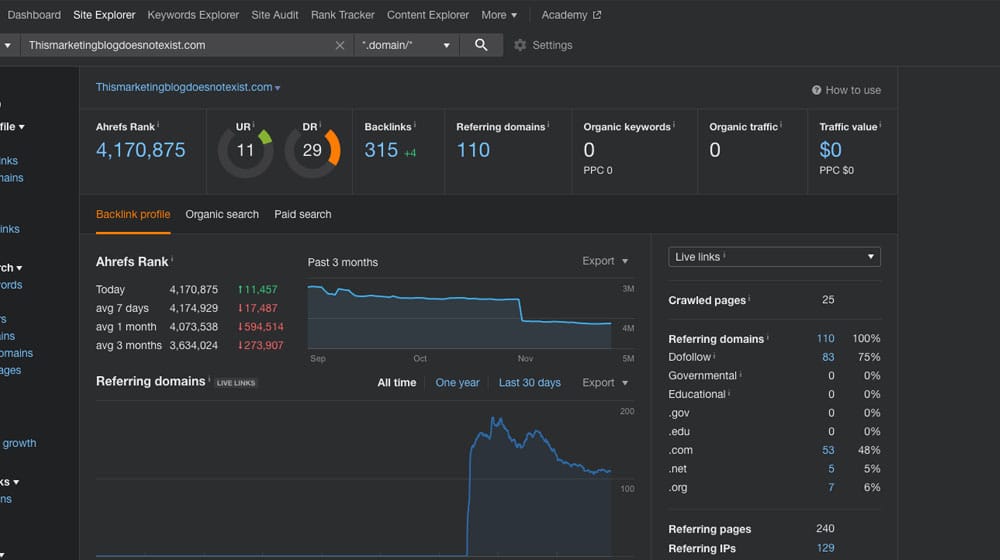
These results may seem impressive to somebody who isn't a content marketer, but a single human-written blog post can easily rank for 292 search terms and generate more than 60 visitors per month. It certainly seems like it indicates AI-generated content can rank and can draw in traffic, right?
The other flaw is the domain itself and the entire framing. It is, as a whole, obviously an experiment in AI-generated content strategy. That means a majority – if not 100% – of the links and traffic the site got were from digital marketing sites, news sites, and people like me checking out supposedly AI-generated content to see if it's viable.
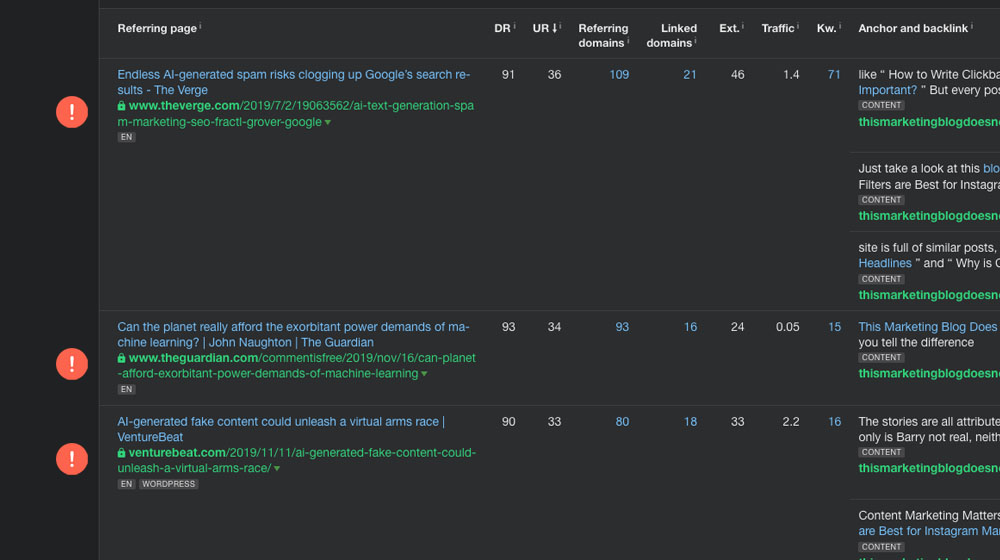
That suggests it was not ranking for its own merits and for the content itself. It was ranking purely based on high-powered backlinks from authority sites, which it only got because of that framework and because it was a high-powered site like Semrush performing this study in the first place. There are hundreds of important metrics and ranking factors, and while content quality is arguably #1, backlinks come in a close 2nd place.
In other words, the study proves nothing except for one thing: Google didn't immediately penalize it. And really, why would they? Google probably also recognized that it wasn't attempting to be anything more than an obvious AI experiment.
There's a reason that Thispersondoesnotexist.com ranks highly for its target keywords even though there isn't a single word of content on the entire website. It ranks for nearly 2,500 keywords on Google and has over 100,000 backlinks, and it's mentioned on every news website that you can think of. Link building is critically important for any SEO strategy.
What Does AI-Written Content Look Like?
I got the opportunity to play around with one of the AI content generators a few weeks ago, and let me tell you:
Compare these two.
- My blog post about whether or not unique images benefit SEO
- AI-generated content on the same topic. Basic text and the expanded section (seen in the image below).
Mine gives you practical information, advice, and data to back it up, and the AI version does not:
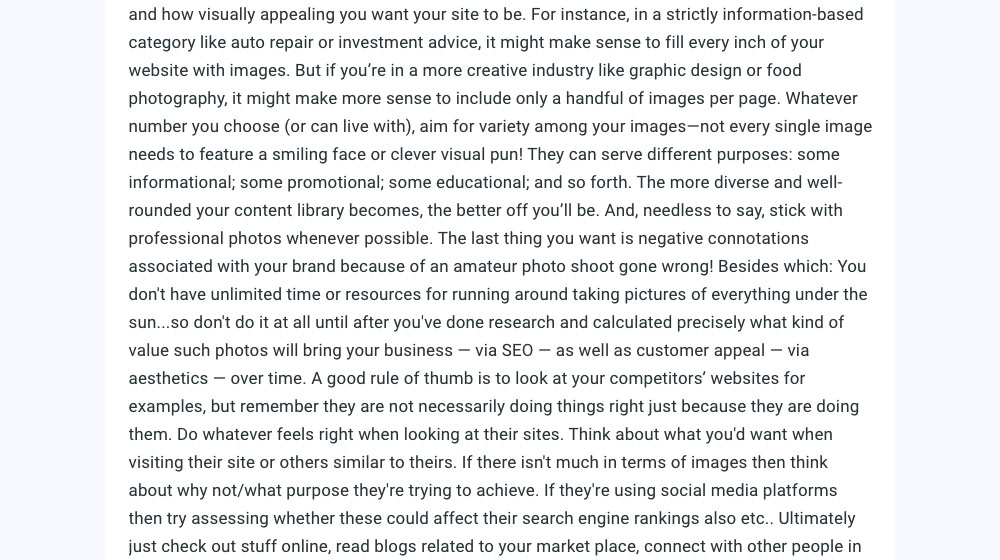
The AI version has a ton of flaws.
- It gives terrible advice. For example, it suggests that an informational site should be packed with images, while a website focusing on photography or graphic design shouldn't. This recommendation is precisely the opposite of good advice, and it isn't even common sense.
- It still has nonsense in it. What does "you don't want to confuse customers or send them running for their wallets" mean? Plus, recommending frequent image changes is pretty nonsensical in the first place.
- It leaves out chunks of content. The "what kinds of images work best" section gives zero relevant information. It says "I'll give X reasons below" and then doesn't list any of those reasons. No human reader is going to like that, that's for sure!
I also have some nitpicks with it.
- It defines SEO in parentheticals twice. It's unnecessary to repeat that definition, and probably even once as well, since anyone reading this topic already knows what SEO stands for.
- It has no conclusion—just zero wrap-up to the post, not even an attempt at it.
- It's short, under 500 words long. Of course, you can manually generate more sections for the article, but the longer the article gets, the more nonsense that gets generated, and the more challenging it is to edit (and the easier it is for Google to catch it).
Under the "expanded section" link above, I told the AI to make one of the sections longer. What I got was one massive paragraph with a couple of pieces of decent information and a lot of barely-on-topic sentences or repeats of what it already said. And it wraps up on a completely off-topic chunk of text.
If I searched for information about image SEO and saw that, I would close out of the site immediately since it rambles on nonsensically and strays off-topic. So would any discerning reader.
Here's another example, something I had generated mirroring a topic I wrote for one of my clients:

Again, we see a substantial unbroken wall of text, digressions into off-topic content, a lot of the information it does have doesn't make sense or isn't logical, and it even attributes a statement to someone who almost definitely didn't make it!
What Are The Flaws of AI Content?
The one critical flaw with AI-generated content – and the flaw that will likely not be solved in our lifetimes, at least not with technology we currently have – is that it's still just glorified article spinning and lacks thought.
By definition, AI-generated content cannot yet create original thought, and it simply takes content that already exists and formulates it in new ways. It's more sophisticated than article spinning because it can have much more esoteric patterns and hide its source. But:
- If an AI gives you a tip, it's generating that tip out of the whole cloth. Either that tip has been mentioned elsewhere, and the AI copied it, or it hasn't.
- If the tip hasn't been mentioned elsewhere, it may or may not be worthwhile at all.
Just take my example above, when the AI recommended that some sites should have very few images. That's fine! Some websites don't need images. But to recommend that sites focused specifically around images shouldn't use images? That makes no sense. The AI took keywords related to images and put them next to advice relating to images but had no cognitive oversight to understand it was wrong.
The AI will make shot-in-the-dark recommendations. Will some of them hit and be accurate? Sure. Many of them will be bad advice because the AI doesn't know anything and doesn't think about anything; it just spins up content about a topic and will continue until you tell it to stop.
Are There Any Ways in Which AI Content is Useful?
I will say that I'm being a little harsh on AI content generators. But, I'm doing so in response to news articles being equally excited and scared of AI content. All of those "Dear Content Writers: Your Jobs are Threatened" stories are just nonsense, sensationalist pieces designed to promote how great the AI content is. They are often written by people who don't yet understand how important it is to put thought into what you're writing.
The truth is, my example is also a little misrepresentative. That's because these content generators are not necessarily designed for blog posts. Or, instead, you can use them for blog posts, but the more content they write, the more likely it is that they'll break.
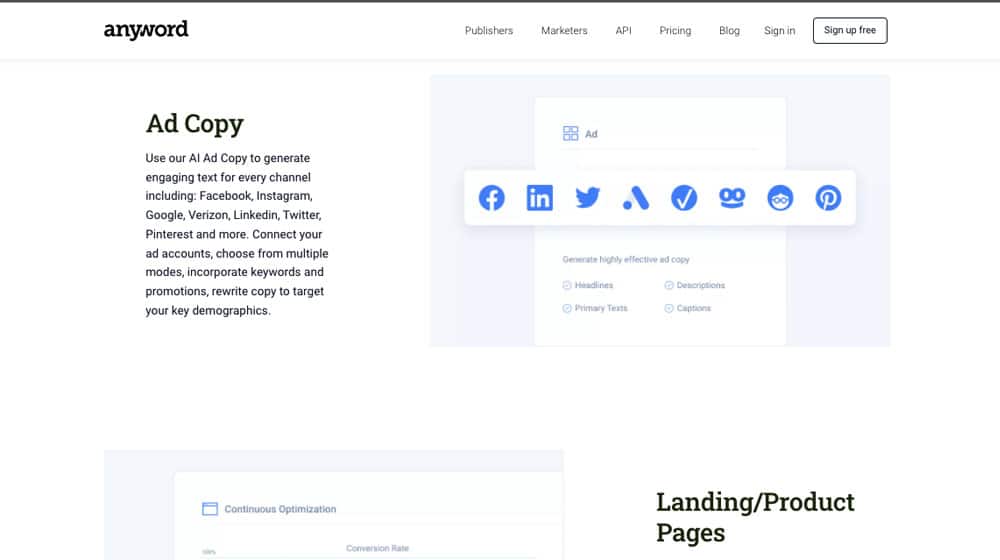
AI-generated content can be helpful as a starting point or to get your creative juices flowing for quality content, as long as two rules are followed:
- The content that you generate is kept short, often under 200-300 words.
- There is human oversight to edit and fix issues the AI doesn't understand, provide unique value, and keep the article on the topic.
AI-generated content can be helpful in a few different ways.
You can use AI-generated content to write ad copy.
Ad copy is usually only a few words, maybe a couple dozen at most. An AI can generate content that looks and feels just fine in that amount of space, and there's not enough room for logical flow, innovative thought, or really anything of value to come through.
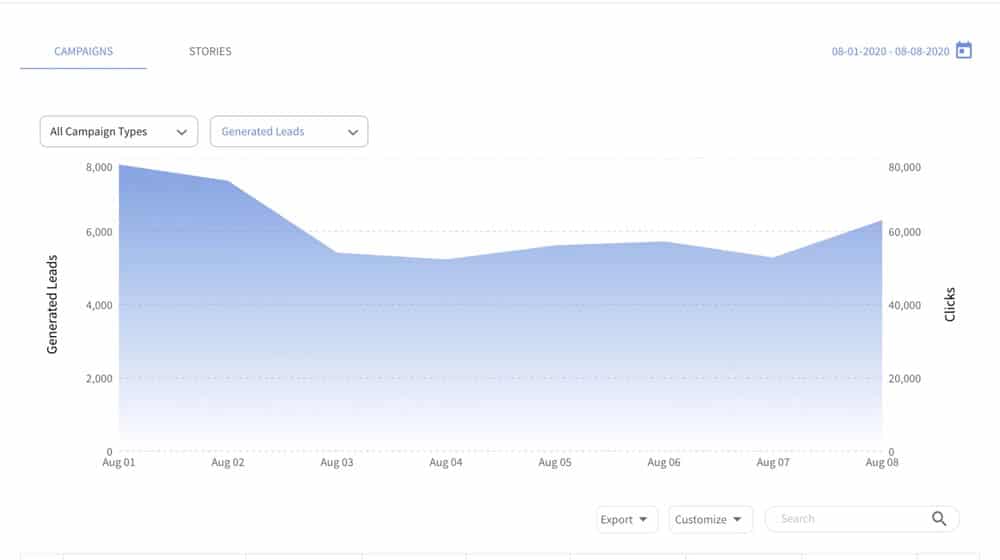
Of course, the AI still needs oversight, so you aren't generating content that promises a specific feature or discount that you don't offer.
You can use AI-generated content to create advanced lorem ipsum filler.
"Lorem ipsum dolor sit amet," yadda yadda SEO benefits of random writing. Many websites use "lorem ipsum" as filler to see how a page would look with "natural-looking" text, but it can be hard to judge when you're distracted by the faux-latin. So, an AI can generate realistic-looking text with keywords that you can do things like format and emphasize in realistic ways to give you a better impression of what your site would look like. It's not much of an advantage over lorem ipsum, but it's something.
You can use AI-generated content to create a test website site to see how it performs.
There are two groups of websites; the first are the sites where the people writing are thought leaders, pushing the cutting edge of discourse and drawing unique conclusions. The second group contains all remaining websites on the internet. Anyone trying to fill a site with content and who doesn't care about it being actually cutting-edge or truly unique can use an AI to pump out content. Some of them may even be able to get them to be helpful and readable; again, as long as there is human oversight to remove wrong or irrelevant information.
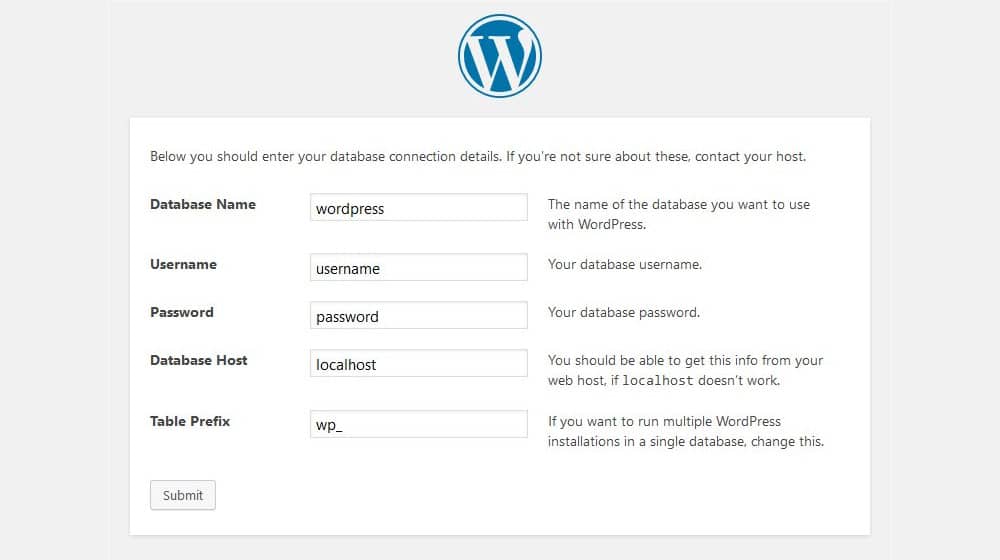
I don't think any site powered by AI content will rank well on its own merits. AI content isn't good enough or valuable enough to earn backlinks without a significant website or framework powering it (like the Semrush experiment). Playing around with AI content on a test website is much safer than risking a website with a good reputation.
You can use AI-generated content as low-value filler for thin sites.
Let's be honest here; AI-generated content is attractive to sites that don't care about quality human visitors. Anyone running a thin affiliate site, a spam site, a private blog network; these people don't care about human readers. They care that Google doesn't penalize them, which they will if the site uses stolen, copied, thin, or lazy spun content.
There's a common problem in engineering and a lot of people-focused roles. If you were to engineer a locking gate system designed to let humans in and out, but that prevents primates from making it through, you encounter this problem. Some people are dumber than the most intelligent primates; some primates might slip through the gate, and some humans might be locked out.
In more online-relevant terms, clever software may write better content than the worst writers. Some legitimate writers may get penalized when Google thinks it was generated automatically, and some AI content may rank highly and be mistaken as human-written. It's very challenging, perhaps even impossible, to design a system that can effectively separate human-written content from non-human content.

I bring this up because it's a problem Google has with delivering relevant search results. Some of the things people type into Google search are just so far off-target that it's a miracle they even get relevant SERPs. Google indexes some silly stuff sometimes because of it. AI content can also fit into this category.
Some searches are so specific and niche-based that low-quality duplicate content and broken websites will show up. Google is grasping at straws trying to give the user something relevant, and those low-quality visitors probably won't be staying for long. Some people count those visitors as a success, but I don't. They don't have any value unless you're running ads and are getting paid by impression.
You can use AI-generated content to sell more AI-generated content.
Finally, AI-generated content builds hype through sensationalist journalism and ill-formed experiments to sell more AI content generators.
Does AI content threaten content writers?
It may still get indexed, and it may even get a few visitors. The content we generated on Anyword passed Copyscape, too, which was pretty impressive. So, the content isn't stolen, even though the content itself is poor.
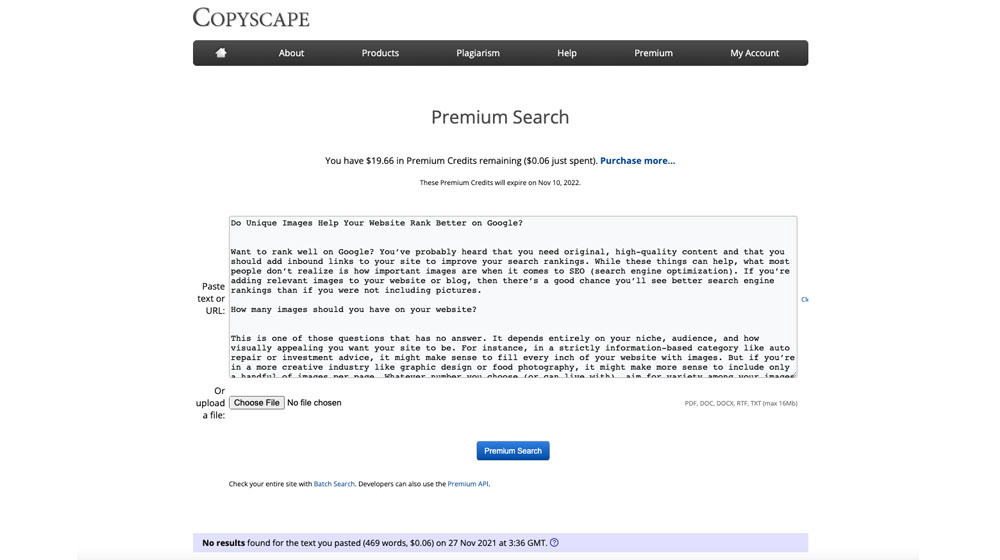
As far as the public knows, Google hasn't developed or implemented a way to nuke AI content that wouldn't also take out a lot of tepid human-written content.
But, AI content will never out-perform human content without something else backing it, like massively powerful backlinks from sites that likely know it is AI-written content and are linking to it as an example, not as a source of good information.
Can AI Content Rank on Google?
In the short term, yes, it can if your goals line up with the effort that you put into these articles.
Here are three scenarios to help you determine which you might fit into:
- Beginner marketers: This is an individual with very basic knowledge of web development, content marketing, and search engine optimization. This type of user is likely interested in AI content for its ease-of-use and speed; you give it minimal inputs, and presto - you've discovered SEO content automation. With bulk content creation, we can safely assume that very little additional work will be done to each blog post - perhaps 5 minutes per generated blog post. In this scenario, we can expect these blog posts to get a small trickle of visitors from ultra long-tail search phrases, accidental clicks, SEO software scrapers, and international searchers. The bounce rate will be high, time on site will be low, and the articles will not attract engaged visitors. The website may be penalized eventually, and they'll receive very few visitors.
- Intermediate marketers: This is an individual with some experience growing successful websites with organic search visitors surpassing 5,000 visitors per day. They know the ins and outs of SEO and are competent content writers, having written many high-performing blog posts. These users will likely see the pros and cons of AI content, using it as a framework to flesh out blog posts. They will carefully shape the direction of the AI content, creating each subheading manually and playing around with the software for 1-2 hours to get the content to a place that mostly makes sense. They will hand the content to an editor for the human touch and add links and images. The editor will polish it heavily before being published and optimize it with tools like Grammarly and Clearscope. A penalty is not likely here, but these posts are not likely to perform at a high level. They will likely get indexed and ranked for some long-tail keywords but may be disappointed with the results for the amount of effort they put into their AI content workflow.
- Advanced marketers: An advanced content marketer will be impressed with the ability of this software to generate Copyscape-passing content so effortlessly, but the problems with the information, tone, consistency, and topic relevance will be immediately apparent. They may use this software to flesh out article outlines or as inspiration during topic research. Any content generated with these tools would never be published to their website, so there is no risk of a penalty. Out of curiosity, they would likely try to push the limits of the software and may even set up a demo on a brand new website to see how it performs.
As I mentioned above, the more you use AI content, the greater the chance of the software breaking. A single 500-word article may rank, but publishing five of them may start to give Google enough data to learn that your content quality is poor. Publishing twenty posts might give them enough data to understand that your content is terrible and your style, vocabulary, reading level, search intent, and topic relevance are entirely random and out of whack - clearly not written by the same person.
Google Rankbrain identifies user intent and separates the relevant content from the fluffy content; whether or not your article is focused on your topic is entirely up to you.
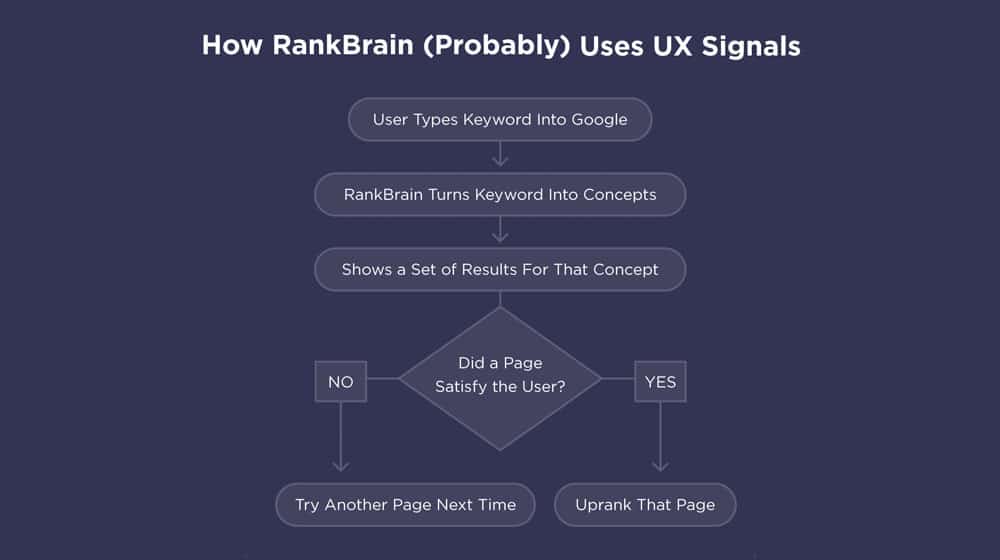
(Image credit: https://backlinko.com/google-rankbrain-seo )
Your website may not get penalized, but it won't hang with the legitimate content marketers without someone putting in an equal amount of work rewriting it. Frankly, that's just as much work as writing the content on your own.
Some people out there will ignore me and switch to AI-written content anyway, and they may even get some visitors from that content. If you ask me, I'm less interested in creating 600 AI posts that attract 60 total visits per day than I am in creating one skyscraper article that attracts 2,000 high-quality visitors per day. Quality over quantity has been the name of the game for SEO for the past decade, and the quality of AI content just isn't there yet. However, if the traffic and content quality meets the user's goals and expectations, I say more power to them.
I have yet to find a blog that consistently publishes AI content that has any meaningful traffic. You'll be scraping the bottom of the barrel, ranking for ultra long-tail searches with a high bounce rate and low time on site. Google is incredibly advanced at determining the value of web pages. If you think that AI can create that type of value with the click of a button and fool search engines and Google's algorithm, you may be disappointed in your visitor analytics after your experiment.
The software is pretty fun to play with, and there are plenty of legitimate use cases.
Just don't set your expectations too high for AI blog content just yet.




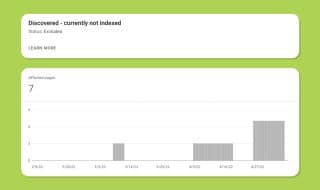

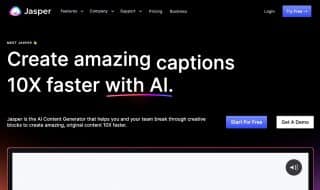



February 23, 2022
Interesting topic. Technology never ceases to amaze me. Still, I don't think AI can be fully adapted to content writing yet. And honestly, I don't think content writers can be fully replaced.
March 04, 2022
Hey Nancy!
Let's hope not, or I'll be out of a job!
I agree; it has a very long way to go. Anything that stitches information together won't be significant for SEO and can be detected. And, even if it reads well, the longer the article, the more "AI-written" content starts to fall off the rails and become easier to detect. It's no wonder that search engines favor quality long-form content.
March 06, 2022
AI-generated content definitely has its uses but I think there's still a lot of room for improvement. Excited to see how AI improves over the next few years though.
March 07, 2022
Hey Tony!
It's going to be interesting to watch.
Google announced a little less than a year ago that they already have a new spam-fighting AI that finds automatically-generated content like this, though it launched sometime in 2020. It's constantly learning and growing better as they encounter more advanced spam trends. So far, it seems like they've been on top of it. Like anything else in the SEO world, though, it will be a cat and mouse game.
April 30, 2023
Hey James,
Thanks for proving my point. I am not a big fan of AI-generated content too. I saw some sites have dropped their ranking a lot and may be penalized due to AI-generated content after coming to the Google helpful content update and other recent updates.
The downside of AI content.
And yeah, Google will not penalize our content instantly if you're generated AI content. It can analyze more content on your site before taking action. And AI content could harm your ranking and affect your brand negatively and the site's reputation, at least in the eyes of Google, which is a very frustrating situation for website owners.
And that's why I decided to publish all the content myself rather than using AI. Because I experimented a lot, AI can't provide the accurate and valuable information as humans can.
I am laughing at those who advise that AI content can rank well on Google. And AI can not and will never replace humans.
Thanks for providing this information.
May 01, 2023
Hey Ahmed, you're welcome, thanks for your feedback!
I'd be interested to hear about your experiments, too.